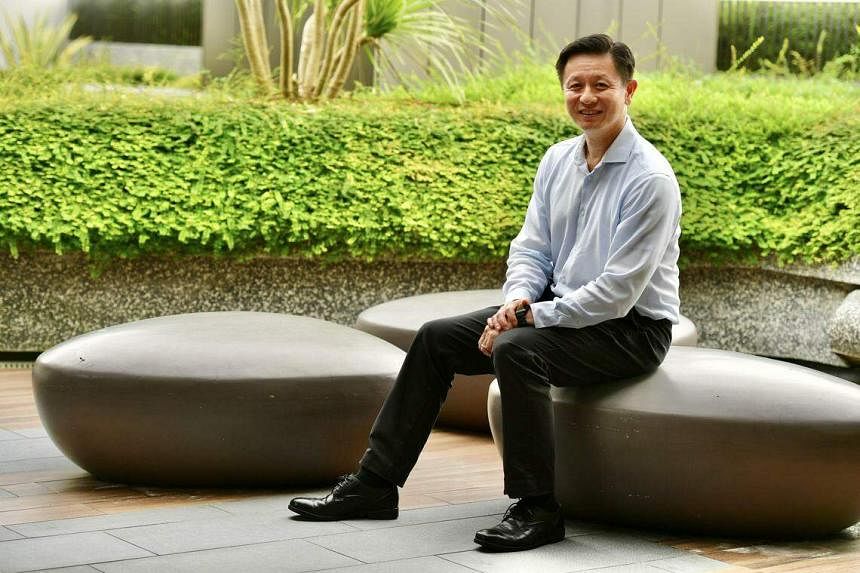SINGAPORE – A chief sustainability officer should not be just an expert in his field and a good strategist, but also an effective communicator and influencer, said Mr Lim Tuang Liang.
He should know, having been named government chief sustainability officer (GCSO) this year – the first person to occupy this role.
Besides being responsible for advising on what is the “greenest” possible direction, the GCSO should challenge the status quo by being an innovator and working out how new solutions can be effectively implemented, Mr Lim added.
The 51-year-old is certainly no stranger to implementing new ideas – he served as the Ministry of Sustainability and the Environment’s (MSE) chief science and technology officer before being appointed to his new role on Jan 1.
As chief science and technology officer, he oversaw the planning and coordination of research and technology development across the ministry in order to create sustainable and cost-effective solutions in water, waste, food and coastal protection.
Before that, he spent close to three years at the National Research Foundation’s Innovation and Enterprise Group as its executive director, where he was in charge of developing strategic technological road maps for Singapore to ensure that local industries remain competitive through the use of technology.
He is also concurrently MSE’s deputy secretary for special duties.
Speaking to reporters for the first time in a wide-ranging interview four months after assuming his current role, Mr Lim said he has been communicating with different agencies to better understand some of the issues they face, and to think of ways to address their challenges.
For instance, agencies have said that they would like to know the bulk of their energy consumption within their premises.
“To support their needs, we have been rolling out energy audits. These audits provide greater clarity of the energy consumption profile and help agencies identify reduction opportunities,” said Mr Lim.
As GCSO, Mr Lim will help to drive nationwide sustainability efforts, including the Singapore Green Plan 2030, which charts – from 2021 to 2030 – how the Republic can achieve sustainable development and reach net zero emissions by 2050.
The plan is wide-ranging and involves the ministries of Education, National Development, Transport, Trade and Industry, and Sustainability and the Environment.
“My team and I would then work to track the progress of the plan carefully to see where progress isn’t as fast as intended, and then have conversations with the relevant agencies to discuss and address some of these challenges,” he added.
For instance, to increase the commercial sales of local produce, an Alliance for Action on Demand Offtake and Consumer Education was recently formed to facilitate discussions with the agri-food industry and food businesses to develop more concrete actions to support local produce, even as Singapore works to produce 30 per cent of its nutritional needs by 2030, said Mr Lim.
To ensure that the Government meets its goal of reaching net zero carbon emissions by 2045, five years ahead of the national target, Mr Lim also oversees the MSE’s Public Sector Sustainability Office, where he is at the forefront of developing regulations and policies, working with other public sector agencies to push the sustainability agenda forward.
One way to accomplish this is by ensuring that the Government reduces its carbon footprint by buying greener goods and services.
Starting in 2024, large projects in the construction and information and communication technologies (ICT) sectors, which make up more than 60 per cent of the value of government procurement tenders, will have up to 5 per cent of the tender evaluation points awarded taking into account sustainability criteria.
Besides greening the public sector, Mr Lim is also working with businesses and the community to spearhead their sustainability efforts as he oversees the MSE’s Sustainability Partnerships Office.
One example of his work with the office would be the SG Eco Fund, a $50 million fund that has so far funded 182 projects worth $9 million, and enabled individuals, small organisations and community groups to develop sustainability-related initiatives.
Ten of these projects will have their work showcased at Plaza Singapura from April 29 to May 7 as part of the mall’s month-long sustainability initiative, said Mr Lim.
Businesses have also been quite willing to partner the Government in advancing sustainability efforts, he noted.
For example, Google is looking to potentially collaborate with the Government to include information on recycling points or reverse vending machines on Google Maps, making them easier to find and access, said Mr Lim.
He said: “I see myself as a conductor. The policy planners compose the music, individual agencies play their sections (by implementing), and as the conductor I oversee the different parts to ensure coordination and harmony to bring out the best in every part.”
Mr Lim has also been doing his part as a private citizen to reduce his carbon footprint.
“Instead of driving, I try to take the MRT home from work at least once or twice a week. I feel that sometimes it can be a lot faster than driving,” he added.
Asked about how he would rate his performance on a personal scorecard, Mr Lim felt that it was “too early” for him to receive a grade.
“I think that I was chosen to take on this (role) because our leaders are confident that I will be able to learn and deliver,” he said.
Asked about what he would be implementing in the year ahead, he said: “We will publish an inaugural GreenGov.SG report later this year, which will outline the public service’s own efforts, progress and plans on environmental sustainability.”


